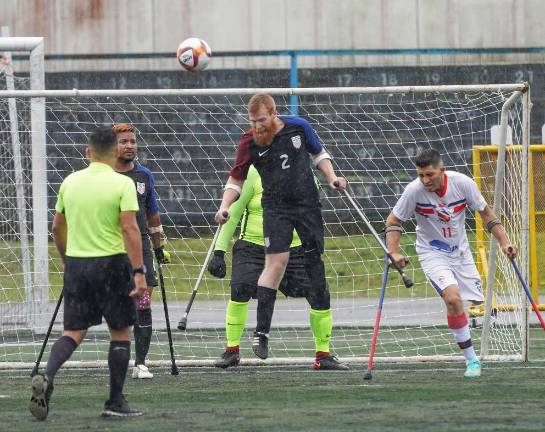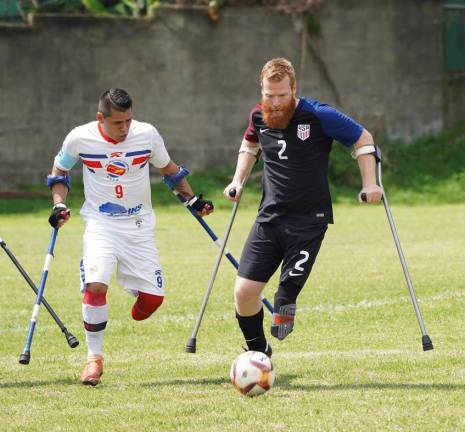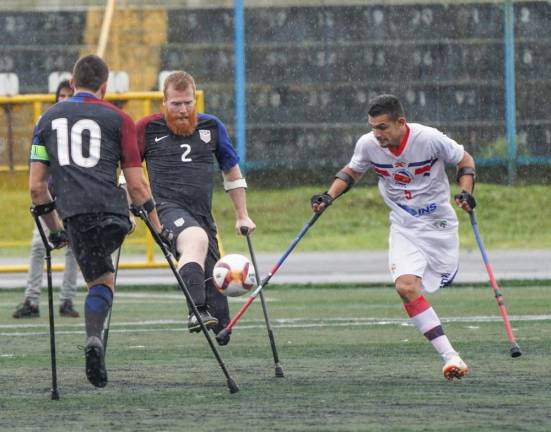Athleticism transformed
Milford. Keith Mann lost his lower leg as a teen and multi-sport athlete. He found a new kind of athleticism in amputee soccer.




A story about soccer, spirit and perseverance
By Ginny Privitar
Keith Mann is an elite athlete: he trains vigorously, running two miles on the streets of Milford before work, often hiking a 4+ mile route on the Milford Knob trails, bicycling 10-30 miles, and swimming at the high school pool. And he does all of this without his lower left leg.
A striker in high school, Mann plays center defense for the U.S. National Amputee Soccer Team, which will be traveling to Istanbul, Turkey, for the Amputee Soccer World Cup at the end of September. This is his third World Cup appearance. The team’s first game is against England on October 1. They will be competing against 24 teams from six regions and people will be able to see the games live.
Mann sometimes uses a prosthetic, but much of the time, including training and games, he uses forearm crutches instead.
“Amputee soccer is a very fast, very physical game which requires a great deal of stamina, upper body strength, smarts and dedication. Keith Mann has it all,” said Rick Hofmann, past president of the American Amputee Soccer Association.
“We want people to recognize these are elite athletes,” said Eric Lamberg, U.S. National Amputee Soccer Team head coach and American Amputee Soccer Association president. “He’s not just playing a sport but excelling by putting in hours and hours to become the best of the best to represent the United States.”
Mann is an elementary school teacher at the Homestead Montessori School in Glen Spey, N.Y. Previously, when he lived in New Jersey, he taught for ten years at the Willow School in Gladstone. A teacher and coach, he loves his job and is grateful the school is supportive and allows him time off for training and travel.
“I get to share with students at the school where I teach and show them the sport I love and my passion for it. One of the things that we do when the team goes to different countries is go to schools and demonstrate how we play the sport and show other kids what’s possible. It’s one of the things I appreciate most about the opportunity I have to do this.
Mann, a multi-sport athlete in high school (soccer, basketball, swimming and tennis), was just 17 when he lost his leg. The summer after his junior year, he was hanging out with friends when he tried a wall running stunt, which went horribly wrong. His leg crashed through a window and the glass cut through the back of his left knee, severing the artery and the nerve.
He was rushed to the hospital where doctors fought to save his life and leg. He spent months in hospital and rehab, and then the recently repaired artery burst. The decision was made to amputate below the knee.
“I took it day by day and had a lot of family and friends support me,” Mann said. He learned to use a prosthetic. “I just tried to keep on moving forward and eventually I was able to swim for that winter season. Then in the spring, I played tennis.”
When he was in the hospital, he was visited by a business partner of his mother’s, who challenged Mann to run with him in the New York City Marathon. At the age of 19, in 2004, he completed the marathon on forearm crutches, without his prosthetic, because the crutches are better for speed and agility.
He graduated in 2007 from Muhlenberg College with a B.A. in Media & Communication and went through the Elementary Certification Program they had.
While he was training for the marathon, he missed the opportunity to play soccer. He came across an obscure amputee soccer website and made contact with Rick Hofmann, an early organizer of the sport. Hofmann invited him to Delaware to watch an amputee soccer game.
In Delaware he met a group of older national team players that had played on the U.S. Amputee Nationals Team and had traveled to different countries to play for the World Cup. As he played against these men he realized he was doing really well because he was young and fast. “I thought that if I worked hard, this might be something that I could continue doing.” said Mann.
“In some ways, losing my leg has created opportunities to be able to showcase my talents and have these incredible opportunities to travel around the world and see different cultures and meet different teams and players and learn from them and just enjoy this sport together. Even though it’s kind of a ruthless competition, we still have this kind of brotherhood. We’re doing things that are incredible and we’re doing it around the world.”
Coach Lamberg summed up Mann’s contributions to the team: “Keith is a fierce competitor; when he steps on the fields he is a warrior and the intensity he brings is infectious and lifts up all of his teammates.”
Hofmann adds, “In adaptive soccer--because of the strength and power of these players worldwide--none of us consider ourselves disabled.”
Mann says this is really not a story about him, but a story about soccer and his incredible team, pros who are redefining the term “disability.”
“I’m often told that I’m an inspiration. I think inspiration can come from the qualities within each one of us. My differences are clear on appearance, but others have unique talents and qualities, too. It’s up to us to find those qualities in others that inspire us to appreciate each other.”
In adaptive soccer, because of the strength and power of these players worldwide, none of us consider ourselves disabled. -- Rick Hofmann, past president of the American Amputee Soccer Association.